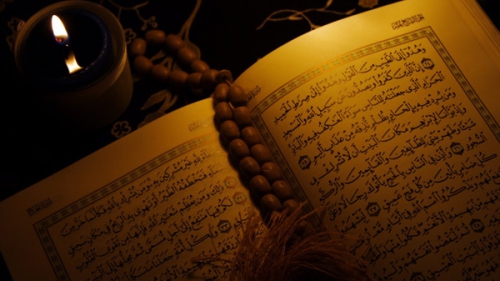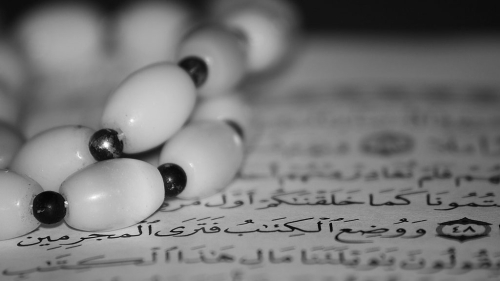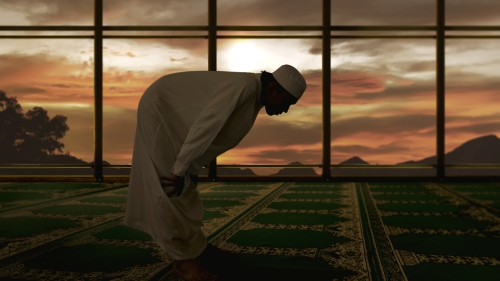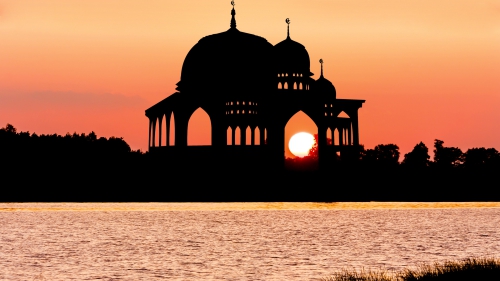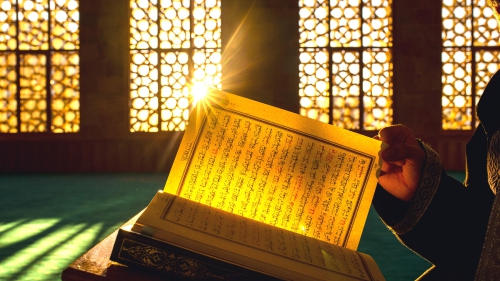Can There Be a Doubt About God?

There is nothing plainer and, at the same time, more powerful than the truth. The truth about life is readily available everywhere and in everything. It easily proves itself because it is the only reality. It is the only thing that actually exists. Everything else is illusory and is, in actual fact, non-existent.
There is no falsehood, no skepticism, no agnosticism, no polytheism, no atheism, no myths and no fiction. There are only some people’s hollow and vain explanations for rejecting the obvious and for failing to conform to its high and noble standards. At best, there is a nonrealization, or a malfunctioning, of the truth at the hands of some people. There are also various misunderstandings and misinterpretations of the same.
The greatest, absolute and the only everlasting reality is Almighty God, the Creator, Master and Sustainer of the universe. Things exist because He created and sustains them. They are real only because He, the ultimate Reality, conceived and fashioned them in order to serve a real and consequential ontological purpose. They constitute the truth only inasmuch as they originated from Him as the absolute Truth, serve His aims, and intensely resonate, as well as unambiguously manifest, His magnificent Names and Attributes.
In their capacity as His work, things, both physical and metaphysical wonders, speak of Almighty God as their Designer and Maker. They are unmistaken signs of His existence, power and glory. They easily instill in willing human minds and hearts serene certitudes concerning that absolute and infinite Reality.
This verity led a poet to proclaim:
“Oh, what an oddity…
How is it that Allah is disobeyed,
How can a disbeliever deny Him,
When in every single thing there is a sign,
Revealing that He is the One!”
By virtue of being one of those created and conditionally real and true things, containing elements of both the physical and metaphysical poles of existence, man’s task, via his multidimensional being, is not only to reveal and demonstrate the greatness of God, and stand for some of His most irresistible signs, but also to rationalize those signs and operationalize their worth at various planes of his cultural and civilizational drive. Based on the results of such processes, man is invited to realize, both spiritually and rationally, and accept willingly that God is his Creator and Master, according to Whose Will and Word he is bidden to live, work and produce components of civilization.
Through the lens of such a realization, man is to “witness” and come to terms with God’s omnipresence, omnipotence and omniscience. Man is thus to understand God and unmistakably see and read all the portents that lead to Him and attest to His encircling providential care for His creation. With that, man, furthermore, will unmistakably see and comprehend his very self, for he who knows himself, knows God, and he who is at peace with himself, is at peace with God. This will qualify man, and, at the same time, connote a prelude to seeing God in all His divine majesty and glory in the Hereafter in Paradise.
In his capacity as God’s vicegerent on earth, man, therefore, stands at the center of the whole of existence, and everything in the universe has been subjected to him to be part of his existential purpose and mission. Man, it follows, stands at the core of the whole truth, too. He himself is the truth’s microcosm. As integral part of it, man exists due to the truth, for the truth, with the truth and by means of the truth. His terrestrial task is to recognize himself as part of it, and through his self and the other both revealed and created signs, find and unreservedly submit himself to God as the Embodiment of all truth and as the only Truly Existing One.
It stands to reason that man is one of the principal and most obvious proofs of the truth and God. While perennially hankering and searching for the truth, as his insatiable primordial nature demands, man thus should go no further than his own intricate physical, spiritual and intellectual realms in his endless quest for the nature and relations of being. Man should not be obsessed with exploring the unexplorable, finding the unfindable and doing the undoable, just to attempt to find, or learn more about, that which is fundamentally identifiable with his own self, his existential disposition and his operational sphere, which is the truth.
Accordingly, the Holy Qur’an at once reminds and exhorts man as regards that essential principle, saying, for example: “In the earth are signs for those who have conviction, and in your own selves (as well). Will you not then perceive?” (al-Dhariyat, 20, 21).
“We will show them Our signs in the universe, and in their own selves, until it becomes manifest to them that this is the truth” (Fussilat, 53).
The following verse is perhaps most emphatic: “Do they not think deeply about themselves? Allah has created not the heavens and the earth, and all that is between them, except with truth and for an appointed term. And indeed many of mankind deny the meeting with their Lord” (al-Rum, 8).
As if Almighty God divulges to man that by thinking, exploring and studying both deeply and sincerely about himself, he will be able to arrive at the greatest ontological truths not only about himself, but also about the whole universe and even God Himself. This is so due to man being a microcosm of the macrocosm and the epicenter in the created coherence and order. Man is the crown and climax of God’s divine act of creation.
The Prophet (pbuh) further emphasized the matter when he said that God created Adam, the first man and father of humanity, with His own Hands and in His own Image (Sahih Muslim). This means that Adam (mankind) has been bestowed with life, knowledge, power of hearing, seeing, understanding, etc., but the features of Adam (mankind) are different from those of God; only the names are the same. For instance, God has life, knowledge and power of understanding, and Adam (mankind) also has them, but there is no comparison between the Creator and the created things, as the Qur’an declares: “There is nothing like Him, and He is the All-Hearer, the All-Seer” (al-Shura, 11).
However, the problem is that man, primarily due to his arrogance and a number of mishandled inborn limitations and weaknesses, tends to rebel against his very self, his Creator and the natural order of things. In the process, he undermines his remarkable capacities, debilitates his senses and hinders his progression towards a proper comprehension of himself, existence and God. Under such circumstances, man renders himself perennially confused, disoriented, vulnerable and despondent. In the name of science, technology and civilization, he hides his real conditions, trying desperately to paper over them. The whole scenario signifies one of the worst forms of spiritual and intellectual escapism where fiction is more favored and seems to make more sense than reality, and where the mysterious, yet imaginary, side of man is more pursued than the actual one. Unfortunately, the entire scheme is a lost cause, denoting a steady progression towards the utter destruction of man and what he erroneously deemed his civilizational headway.
That is why, for example, the modern man is happy to spend billions upon billions of dollars on space exploration programs -- which, in fact, yields extremely little tangible benefit -- but ignores the fact that much of the earth is not fully explored yet, that there are many either already widespread, or brewing, global crises that can threaten the very existence of mankind, that hundreds of millions of people in many parts of the world still straggle to fulfil their basic needs, that mankind is on the brink of a major environmental disaster, etc.
That is why, furthermore, the modern man is happy to dwell ad infinitum on such meaningless and outright nonsensical issues as aliens, the prospects of mankind’s supernaturalism and immortality, numerous unfounded myths, superstitions and legends, etc., but easily ignores the painful realities that racism and discrimination are rampant, that the ignorant, corrupt and outright evil ones rule the world, that human rights are yet to be clearly defined, let alone implemented, that the definitions of marriage and family, and many other concepts and issues that go along with them, are still hotly debated at all levels, that the role and position of woman are still unclear, that only ‘might is right’ like during the darkest and most primitive periods of human existence, that most of us are educated but vastly ignorant, never mind wise, etc.
So many obstacles and veils did the modern man place between himself and the truth that his vision was rendered blurred and distorted, and that most of his thinking paradigms became flawed and his judgments incoherent and one-sided almost beyond repair. So much so that in most authentic spiritual terms, the modern man has eyes but cannot see, has ears but cannot hear, and has the heart but cannot perceive and embrace the truth despite it being readily seeable, hearable, perceivable and livable.
Indeed, the similitude of such as negate and repudiate the obvious signs contained at once in revelation and creation is that of Iblis (Satan) who knew God, spoke to Him, knew the purpose of man’s creation and all creation, lived with angels, etc., yet, he rebelled against God and His authority, as well as against the spiritual order of ideas and things, and became voluntarily ruined in both worlds: “…He refused and was haughty; he was of those who reject Faith” (al-Baqarah, 34).
Moreover, their similitude is that of all those who rejected the Prophets, in spite of witnessing a series of world-shattering miracles being performed at their hands, dismissing them simply as acts of sorcery, folly, shamanism, or extraordinary talents. To them, every debased form of hedonism, disbelief, hypocrisy, superstition and polytheism made more sense than believing in the One true and transcendent God Who created them and was ceaselessly communicating with them via their Prophets and revelations.
Nevertheless, the problem is never the truth. The problem is always man’s inability to see it, and his unwillingness to genuinely find, embrace and live it. The problem, further, is always with man, and inside his individuality, not with, or inside, anything else. Instead of his life and his character being shaped in its image, man keeps trying to alter and shape the truth in his own despairing and tumultuous image.
Hence, the arguments of sceptics and disbelievers against the truth and God are always unquestionably false and illogical, and move in circles. Instead of clearing thus their confusion and doubts, they keep compounding them. Their arguments are as inconsequential, irrational and sterile as the life systems and civilizational models they put forth as alternatives to what was divinely revealed to the holy Prophets.
That was a chief reason why the Prophets used to exclaim: “What! Can there be a doubt about Allah, the Creator (Fatir) of the heavens and the earth?” (Ibrahim, 10). The Prophets did so while disputing with the disbelieving members of their communities, and finding it difficult to fathom why they could not see, nor hear, nor perceive the obvious and compelling truth which was discernible as much in the smallest and simplest as in the grandest and most convoluted.
Certainly, it was not by chance that the word used in the above verse for “the Creator” is Fatir, which implies not only creating and bringing the universe and everything in it into existence, but also giving every created thing its particular character, objective and meaning. This connotes total harmony, equilibrium, balance and stability that pervade each and every aspect and component of creation and their subtle relationships.
Related to the same word is another term, fitrah, which approximately means “primordial nature” or “instinct”, which, together with its repositories and carriers, constantly and avidly craves for and seeks its Creator. The close relationship between Fatir (the Creator) and fitrah (primordial nature or instinct) brings to light that Islamic monotheism and man’s – as well as everything else’s -- constant inclining to the truth constitute the pattern on which God has made mankind and the whole of the universe (al-Rum, 30).
Along the same lines, the angles, the guardians of Hell, as well, will imply on the Day of Judgment that more people should have followed their Prophets and the heavenly messages revealed to them. They will wonder, with an apparent degree of surprise, what might have held people back from reading and comprehending the undeniable signs, and from heeding their Prophets’ honest and reasonable warnings, and why (al-Zumar, 71). As if the angels will ask what made those people betray themselves, their primordial covenant with their Creator, and their preordained nature, or instinct.
What man needs, most of all, in order to set things right, is to cleanse his mind and purify his soul, so as to be able to function as a normal, but enlightened and responsible, human being and as God’s vicegerent on earth. That’s not a tall order, though, because man, after all, has been created but to worship his Creator and to serve Him only in all his affairs. Man has been created innocent, pure and fully compatible only with the ultimate truth. His task, therefore, is to remain faithful to himself, his Creator and Master, and to the predetermined scheme of physical and metaphysical portents. In other words, the only thing man ought to do is to stay the course, without straying into the sham worlds of falsehood, deceit and ignorance.
While enjoying and celebrating the immeasurable wealth and beauty of the truth and his unreserved submission to and worship of God alone, such man, from time to time, can wonder what the situation would be if he did not have what he currently has. This is just to become more appreciative of his state, and be more steadfast in what he does.
He can also wonder -- hypothetically and for the sake of boosting his self-confidence and determination -- what doubting, or attempting to disprove the existence of God, could mean, or bring to its executor, and what rationally and intrinsically acceptable could be produced for the purpose.
This is a safe and very productive approach, for it will be discovered that absolutely nothing wholesome, or satisfactory, can be submitted in defense of spiritual skepticism, agnosticism and atheism. It will be found that one of the best strategies for ascertaining the existence of God, essentially, is to try to rationally and innately refute it.
Topics: Taqwa (God Consciousness), Tawhid (Oneness Of God)
Views: 2260
Related Suggestions







